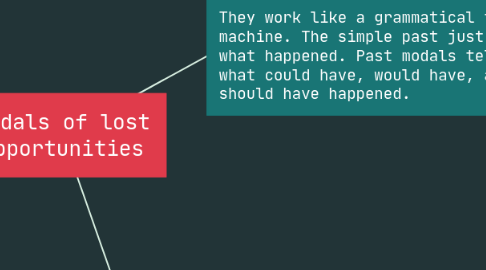
1. They work like a grammatical time machine. The simple past just tells what happened. Past modals tell what could have, would have, and should have happened.
1.1. Could Have
1.1.1. It means that something was possible in the past, but it did not happen.
1.1.1.1. Examples: -Could have been so beautiful. -Could have been so right. -Could have been my lover every day of my life.
1.1.2. Native speakers often do not pronounce their past tense modals clearly. Could have been usually gets contracted to could’ve been or even coulda’ been.
1.2. Would Have
1.2.1. Would have also forms the result clause of a past unreal conditional.
1.2.1.1. For example: -If I had known they were vegetarians, I would have made a salad.
1.2.1.2. It is a bit more difficult because it has two common structures. The first is with but. I would have A, but I had to B. Use this structure to show that you wanted to do something in the past, but you could not.
1.2.1.2.1. Examples: -I would have called, but there was no phone service. I would have loaned you the money, but I didn’t have any.
1.3. Should Have
1.3.1. It means that something did not happen, but we wish it had happened. We use should have to talk about past mistakes and is common in apologies.
1.3.1.1. For Example: -I was so worried about you. You should have called! -I’m sorry that I’m late for work. I should have woken up earlier.
